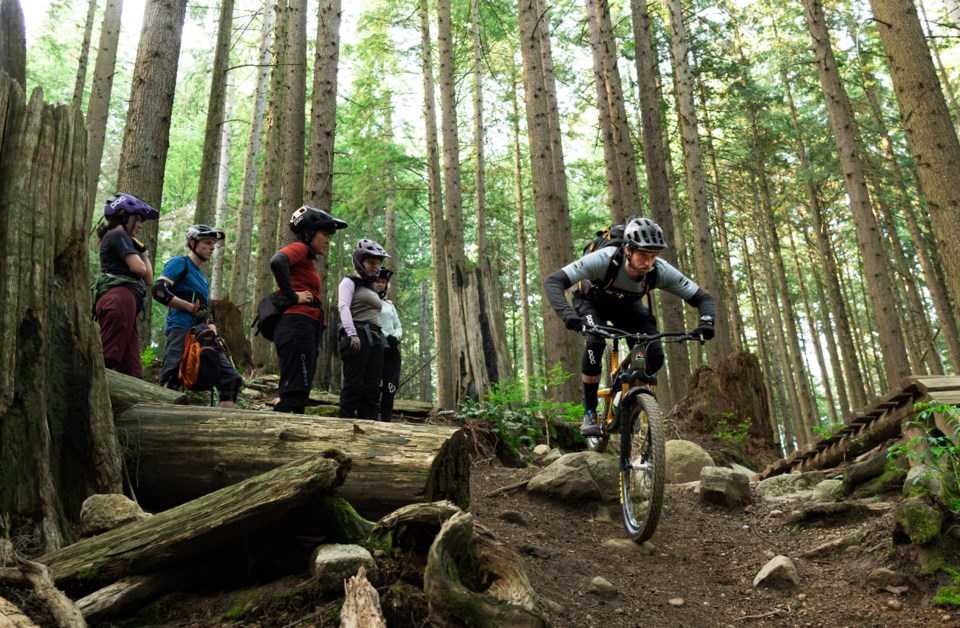A new report from the University of British Columbia suggests there is an “alarming” number of people getting spinal cord injuries while mountain biking.
Researchers found 58 people in B.C. sustained a spinal cord injury while mountain biking between 2008 and 2022. There were only three such injuries from ice hockey in the same 14-year period.
Dr. Brian Kwon, senior author of the study, decided to research the topic after seeing a high number of injuries coming out of mountain-bike parks and trails.
“There were a lot of people coming down the hill with these injuries,” Kwon said. “It’s not something that was particularly subtle of an observation to make.”
Kwon is a spine surgeon at Vancouver General Hospital, a professor of orthopedics and Canada Research Chair in spinal cord injury at UBC.
Spinal cord injuries often lead to permanent and life-altering paralysis, the study says. Researchers found 93 per cent of those injured were young, healthy men, with an average age of 35. Of those injured, 77.5 per cent were propelled over their handlebars, 12 per cent from a collision and 8.8 per cent from other factors.
The majority of those injured were wearing helmets (86 per cent), while nine per cent wore helmets and body protection. Only 4.5 per cent wore no protective gear.
Kwon said the injuries from mountain biking aren’t a surprise given the intensity of the activity.
“People are coming down at speed. They’re coming down with gravity, and they’re negotiating really uneven terrain, and so it’s maybe not surprising that you’re coming down a trail at high speed and you hit a rock, a twig or a root of a tree and you go flying over your handlebars, that your head and neck are going to be pretty vulnerable,” Kwon said.
The monetary cost of the injuries was staggering to Kwon. Researchers estimated that the injuries will collectively cost the province $195.4 million. This includes lifetime healthcare and rehabilitation costs, patient expenses and other economic costs like loss of productivity, according to the study.
Practising good habits
While it can be a risky sport, there are businesses trying to mitigate the dangers. Endless Biking is a rental shop in North Vancouver that offers various mountain biking lessons to teach people good habits when on the trails. Sessions cover multiple levels of experience, from beginners to those who have hit the trails numerous times.
Darren Butler, co-owner of Endless Biking since they opened their doors in 2004, says that taking lessons, wearing some protective gear and knowing your capability are some ways to reduce injury risks when out biking.
“People should be aware that there’s training available,” Butler said. “A lot of sports will have some sort of coaching and development kind of built into it. If you want to take up kite surfing, there’s no kiter that’s going to take you out in the water unless you’ve done some training.”
Some people feel a false sense of capability when out mountain biking due to learning to cycle when they were young, Butler said.
As for protective equipment, Butler said each rider is different, and it can depend on the trail being ridden. Some riders wear padding top to bottom, including neck and back braces, while others like to ride with less padding to not feel constricted, he said.
A lot has changed over the last two decades, Butler said, including improved bikes and trails.
The infrastructure of the trails, maintenance and signage informing riders the level of the route and recommended fitness level are some things that have been added to trails to be more informed before going on the route, Butler said.
“For anyone who’s gone through a life-changing injury, it’s not something that we want to see ever really in any activity, in any sport. Mountain biking does have an appeal because of some of that risk that comes with it, and it’s part of why we do it, and we obviously want to try to minimize those risks,” he said.
Kwon hopes the study findings will bring more awareness to mountain biking injuries and discussions around improving safety.
Moving forward, Kwon plans to look into what and how equipment can effectively protect mountain bikers on the trail.
Abby Luciano is the Indigenous and civic affairs reporter for the North Shore News. This reporting beat is made possible by the Local Journalism Initiative. [email protected]



